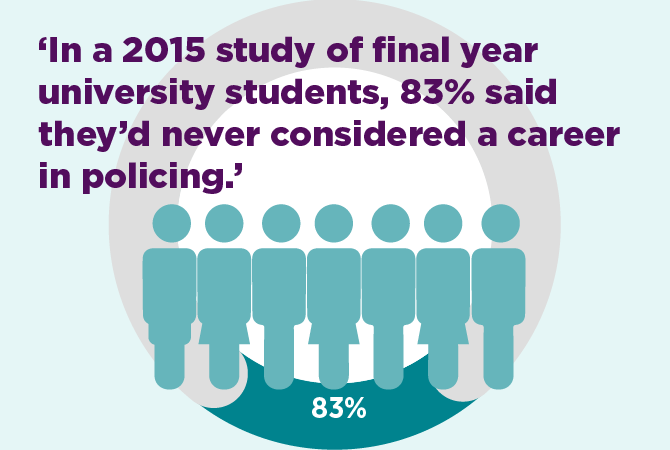The situation
For the people at Police Now, 'You don’t have to be a graduate to be a copper' is a familiar refrain. And they understand the scepticism: many graduate trainee schemes in the police focus on fast-tracking participants up the ranks.
But it seems many graduates aren’t tempted to take up a truncheon, either. In a 2015 study of final year university students, 83% said they’d never considered a career in policing.
Three years on, Police Now is turning sceptics into sales people. Its award-winning two-year leadership development programme places top graduates in the UK’s most deprived communities as neighbourhood police officers. 650 recruits have already gone through the programme, and in 2018, there were 5,500 applicants for just 250 places.
The challenge
Having participants who are part of both the programme and a local police force hasn't always been easy. Fortunately, when they pitched the idea, co-founders Dave Spencer and Tor Garnett knew that similar models had already worked in teaching (Teach First) and social services (Frontline). Since then, they’ve also introduced Learning Development Officers (LDOs) who coach the participants and act as a conduit between them, the police force and Police Now.
Understandably, people have questioned what we're doing over the years. The best way to appreciate it is to spend time with participants. When you see how committed they are and the difference they make, it becomes much clearer what we're about
The solution
The programme consists of an intensive six-week Summer Academy followed by 98 weeks on the policing frontline.
As the Academy is much shorter than other police training, its content has to be spot-on. Police Now ran 'design days' with serving officers to isolate the most impactful skills. They spoke to the national hostage negotiation scheme about communication, and paediatric surgeons about resilience. And they invited 'visiting fellows' – everyone from mayors and lawyers to the victims and perpetrators of crime. The result is 180 hours of learning and practising skills, which includes arresting and interviewing suspects.
Participants then pin on a police badge and start making a difference on the ground. LDOs meet with participants every quarter to reflect on progress and adjust personal development plans. They also send feedback to the participant’s line manager in the local police force. And every 100 days, participants attend impact events where they present what they've achieved. 'It’s very unusual in policing to report back on what you’ve done,' says Head of Learning Development Sarah Carney. 'It reminds people what they’re here to do.'
The demanding, fast-paced programme suits good communicators who can analyse, problem-solve and are committed to helping the people who need it most. As Rhian Samuda, a graduate of the 2015 cohort who now works for the Met, says: 'If you have a heart for public service, it’s the scheme to join.'
It's also important that participants reflect the community they serve. In 2015, Police Now recruited twice as many Black Asian and Minority Ethnic (BAME) officers than previous policing graduate schemes. And 54% of the 2016 cohort was female.
The results
Twelve months after graduating, 80% of participants are still in policing; after three years, it’s 75%. In 2015, 92% of line managers rated their participants as 'excellent' or 'good'. And 92% of participants said they'd recommend the programme to a friend.
Most importantly, though, it's having an impact on communities. Confidence in the police among young people has increased by 17% in locations with a Police Now participant. (It's 3% in comparable locations without one.)
Top tips
So what would Dave say to someone considering starting a similar scheme? 'Find a partner in crime,' he advises. 'Work out what problem you're trying to solve and how you’re going to measure it. And work out who’s going to pay for it.'
Believing in what you’re trying to do is also crucial, says Rhian. 'Everyone working for Police Now genuinely believes in and acts on its mission. If you share that mindset, you can’t go wrong.'

Co-founder and CEO
David Spencer
'Understandably, people have questioned what we're doing over the years. The best way to appreciate it is to spend time with participants. When you see how committed they are and the difference they make, it becomes much clearer what we're about.'
When my friends have a stressful day it's because the company's profits have dropped. When I have a stressful day it's because I've sectioned someone and had to deal with a victim of a serious assault. But what I do is really tangible. And the feeling I get when someone thanks me for helping them lasts for weeks.
CIPD Trust
Tackling barriers to work today whilst creating inclusive workplaces of tomorrow.
Bullying
and harassment
Discover our practice guidance and recommendations to tackle bullying and harassment in the workplace.
Explore other case studies

How a framework for listening and responding to every voice has given the change-weary employees of NIE Networks their spark back

How a team with boundless dedication managed to transform the way the Royal Mencap Society finds and keeps its people

Thanks to its people-focused approach, itsu's initiative to support, engage and reward its fish cutters has gone swimmingly
Next: Core behaviours
Explore the defining behaviours for our profession
Read the CIPD’s November 2023 submission to His Majesty’s Treasury


